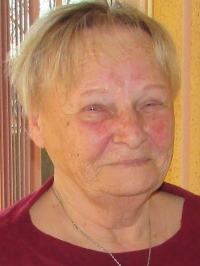A mysterious story from a brickyard
Stáhnout obrázek
Jitka Průchová was born on November 24, 1938 in Sedlec near Kutná Hora. During the war, her father helped Serbian guerrillas. The mother, a nurse in a hospital, had to perform forced labour at the end of the war. After the liberation, the family moved to the border, to Velká Hleďsebe near Mariánské Lázně. After primary school, she attended a secondary school in Mariánské Lázně and after the final exams she continued her studies at a medical school in Cheb. She worked as a nurse in the spa in Tepelský dům and in Nové lázně. She met her husband in Velká Hleďsebe. He was a professional soldier and throughout his life he performed military service in the barracks in Klimentov. A total of five daughters were born to them. After maternity leave, she worked for twenty-one years as a saleswoman in Armenia. She lived in Velká Hleďsebe at the time of filming the interview (2019).
